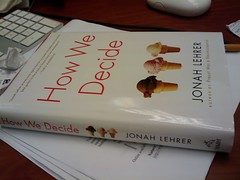 April '10 - I use this phrase on a regular basis in my home. When my daughter wants to tell me the details about what happened to her little friend in the bathroom at school, I hold up my hand and say, “STOP! Too Much Information!” When my son wants to describe the reproductive activities of our pet hamsters I say, “WHOA! Too Much Information!” When my husband lists all the different places we could visit on our upcoming trip … you get the picture.
April '10 - I use this phrase on a regular basis in my home. When my daughter wants to tell me the details about what happened to her little friend in the bathroom at school, I hold up my hand and say, “STOP! Too Much Information!” When my son wants to describe the reproductive activities of our pet hamsters I say, “WHOA! Too Much Information!” When my husband lists all the different places we could visit on our upcoming trip … you get the picture.I am forever trying to find ways to simplify my life. Perhaps I am a very unusual person, but I hold out hope that there are other people like me in the world, people who prefer fewer choices and fewer demands on their senses.
Shopping is overwhelming for me – there are just too many options. I grew up in Africa in the 1970s and 1980s. We had three, count them, three choices of breakfast cereal and yet we somehow managed to survive. I don’t need 70 options - and I don't want 70 options.
I’m so glad I live in Thailand where commercials are censored; I’d rather not be bombarded with the latest information on all the new products or trendy new TV dramas that demand my immediate attention. If I want to know what’s on TV I’ll look in the TV Guide. If I need something, I’ll go shopping.
I’m one of those people who rarely turns music on; I don’t wear headphones when I exercise. This is not because I don’t enjoy music, but because when I add extra sounds to my environment, I miss out on the natural music of my surroundings: birdsong, the whisperings of leaves in the trees, children laughing and shouting, even the sound of my own rhythmic breathing when I exercise. If I want music, I’ll sing. Too much noise is sensory overload for me.
I recently finished reading a book – yup, a real, hold-it-in-your-hands-and-turn-the-pages book (call me old-fashioned) entitled “How We Decide” by Jonah Lehrer. He begins by explaining how experts make decisions. Their years of training and practice become a solid foundation for their decisions. The pro quarterback doesn’t evaluate each play and make a conscious choice about which receiver to throw to, he just gets a feel for the action on the field and then lets his instincts direct his hand. There is just TOO MUCH INFORMATION coming his way during a 15-second play for him to analyze. He has to rely on his emotions – yup, you read that right, his gut tells him when to throw the ball and to whom. According to Mr. Lehrer, this holds true for most other skilled professionals as well.
Mr. Lehrer then goes on to describe a multitude of studies which show that when people are asked to explain their reasons WHY they should choose one type of jelly or wine over another, or why they should buy the new house in the suburbs, or why they like this poster more than that poster, people are far more likely to make a bad choice that they will later REGRET. Thinking too much about their likes and dislikes, and having to justify their thoughts, actually causes them to choose something that is not the best choice for them.
Mr. Lehrer explains that 'overthinkers' are relying on one myth that we as a society perpetuate: rational thought and informed decision-making should guide our choices.
A friend of mine is considering which preschool is the right one for her daughter. Our babysitter is trying to choose just the right college. A colleague is considering several job opportunities. My neighbor is looking to buy a car. Each of these decisions is highly complex. With a multitude of factors to consider, how does one weigh the pros and cons of each factor and arrive at the most logical, rational decision?
Mr. Lehrer states, "The main problem is that the human brian wasn't designed to deal with such a surfeit of data. As a result, we are constantly exceeding the capacity of our prefrontal cortices, feeding them more facts and figures than they can handle. It's like trying to run a new computer program on an old machine; the antique microchips try to keep up, but eventually they fizzle out." (pg. 158) Our frontal cortex, the part of our brain responsible for rational thought, is new on the evolutionary scene. However, our limbic system which is responsible for generating feelings, is located in the brain stem, our primitive brain. This is a brain part that we have in common with dinosaurs and therefore, quite a bit older on the evolutionary timeline. Modern man tries to use our newest, and most glitchy brain region to determine the best course of action when we would probably be better off trusting our most evolved and experienced brain region - and trusting those gut feelings.
Thank you, Mr. Lehrer! I've been waiting for someone to validate the way I make decisions; a) get a fair idea of what the options are, b) see what my wallet can responsibly manage, c) pray and sleep on it if it's expensive or really important, and then d) go with my gut feeling. This old operating system seems to be working just fine, so can anyone tell me how to jam those annoying program update pop-ups that keep interrupting this blog entry?


No comments:
Post a Comment